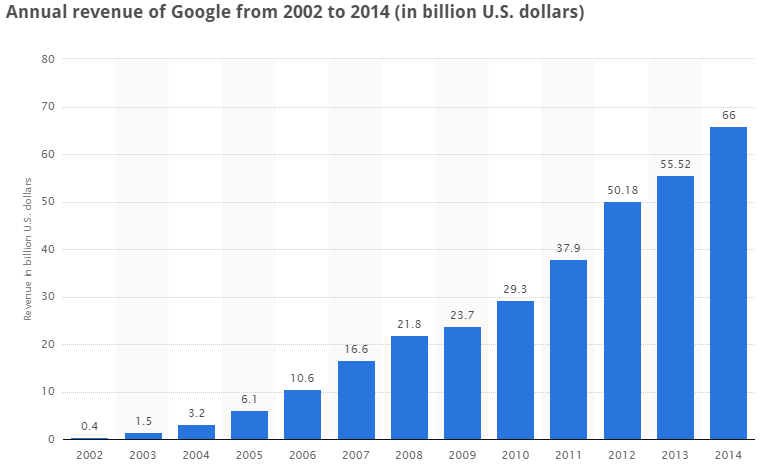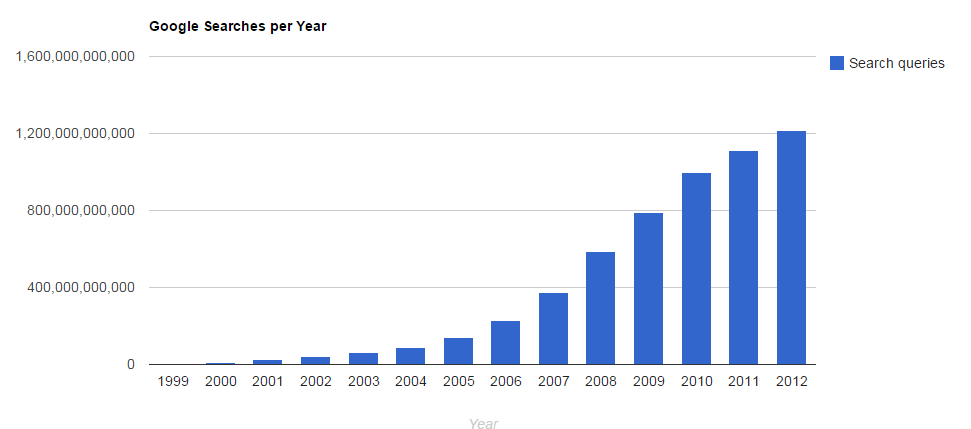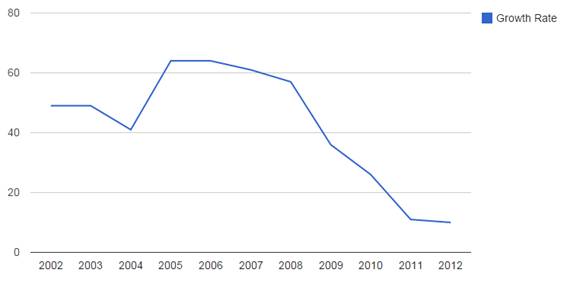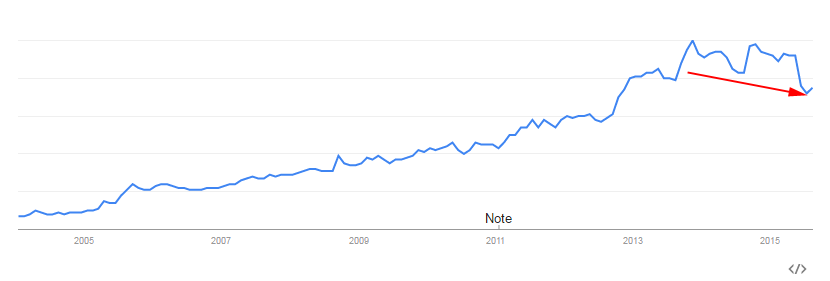While Google’s homepage hasn’t, bar for a few tidbits, changed in the last years, the behavior of online searchers has dramatically changed. When Google originally started their services in 2001 there wasn’t many websites and products to search for – at least compared to 2015.
For this reason users were happy to find a matching website or product that solves their problem.
But users have changed their ways and their expectations have changed. Users are now looking for the best match. Any they know that in many cases it isn’t always on Google. Online searchers are developing new habits counter those we have gotten used to in the past.
What does this mean for Google and us search marketers and advertisers?
Forgetting the Big Picture
Day for day one toils away doing whatever one must to increase the performance of one’s advertising, website or even internal matters like sales and production.
In some cases this is done in adherence with strategic plans laid out after careful research of the past. In other case actions are capriciously undertaken, based on the last webinar or the latest post read on inbound.org that contained some good ideas.
Either way, one can forget to kept an eye on the data of the macro environment in which ones business model resides.
Macro environment is defined as: The conditions that exist in the economy as a whole, rather than in a particular sector or region.
In this case the macro environment in question is Search Engine Marketing on Google.
(In Germany Google has an apparent market share of over 95%, at least when looking at the main engines Yahoo, Bing and a few local ones, so for us it is apparently the only relevant search engine – more to that in a bit)
And if I would reduce all the lessons of life in last 20 years into one, then it would be that:
Changes is inevitable and in many cases they are just around the corner.
Internet, Social Media, tools, technology, demographics, politics etc….. Things are in a constant rush for change, nothing stays the same for a long time.
The same can be said of markets – markets always change – nowadays more than ever.
So it makes sense to take a look at the macro data once in a while. Google Trends is a great tool for this.
(I wouldn’t swear on the accuracy of Google Trends, but for the sake of thought provocation and fun, let’s assume that it is more right than wrong)
Additionally, what the internet has come to mean so much for so many businesses, it is well worth the time.
Online Advertising Is Relevant For Most Businesses
Ok, for starters, let me regurgitate a few headlines of the latest business magazines and internet blogs and hopefully prove a point:
The past decade online marketing has grown and become for most business owners a serious topich and a high-priority on their to-do-list.
Proof: spend in online marketing has been climbing and climbing. Google, the biggest advertising company in the world, increased its yearly turnover sky high to 49 Billion since 2001. Take a look at the graph.
Google Turnover Keeps Climbing Since 2002

Source: www.statista.com/statistics/266206/googles-annual-global-revenue/
That is of course incredible. Google is by now one of the biggest companies worldwide. In online advertising, they are by far the strongest company.
And to just to make another case in point: E-Commerce turnover in 2014 has increased to a record 304.91 billion in the US and 43,6 billion in Germany – the country I call home.
The boom in Google’s turnover and that in E-Commerce businesses doesn’t seem to be ending soon.
But that doesn’t mean that online advertisers and website owners can expect unlimited, never-ending growth.
Our income is not tied to Google’s or to any online retailers for that matter.
(I don’t want to know how many online businesses are a far cry from being successful or just vaguely profitable. )
Search Volume Growth Rate Slows Down
Interestingly, yet understandably, the growth rate of search queries is not increasing. It is still decent growth but the volume is normalizing at a high level.
Google searches per year:

Source: internetlivestats.com/google-search-statistics/
Google Search Volume Growth Rate (in %)

Source: internetlivestats.com/google-search-statistics/
This of course represents the overall numbers worldwide. And considering the increased use of bots to collect data on Google, manipulate CTRs and so on, this chart might even look very different.
Another interesting graph is the search volume for “Google” on Google according to Google Trends in the US:

Considering the growth level of Google’s turnover the numbers are somewhat surprising or even disappointing, but understandable. (Remember everything changes – even markets)
But do these overall figures apply to all markets?
No.
Search Volume Changes From Business to Business
In some markets like dentistry (US) we have a steady growth rate exceeding the average:

Search queries (US) for insurance on the other hand has been declining – does that mean insurances are being sought and bought less often? No it doesn’t. I added a complete explanation at the end of the post.

So has queries for holidays (US):

While people have been searching for smartphones (US) incredibly often:

Ipads were being searched a lot, not so much anymore:

Movie streaming is a nicely growing market:

As you can see, the figures change from market to market.
But one can safely state that the exponential growth we had is in average over.
We have a high level of traffic that is being shared by many websites. But in many cases, it isn’t growing.
This situation as defined in the product cycles is the 3rd phase, which is the Maturity stage. The full list of stages are: product introduction, growth, maturity and decline.
In this stage we have websites competing for the same valuable traffic, where sales growth rates are diminishing and the primary strategy is to defend ones market share. – Sound familiar?
The Role of Search as We Know it Will Drop in Importance
Yep that is my earnest opinion.
The days of one search engine for all types of searches are ending.
Just like any other product or advertising media for that matter (even when newspapers try to negate the laws of nature), there comes a time when other better forms of a product emerge that replace that of contemporary ones.
This always happens – it might be a better search engine or just the rise of hundreds of specialized search engines as we are already seeing with Amazon for products, or citations or review sites for local businesses.
It is only a matter of time.
To illustrate my point, let me go back to the topic of insurances and their search volume in Germany:
(For those who want to verify the figure, the German word is Versicherung)

I think you will agree, the figures are declining or at least not growing.
Now compare that to the search volume for Check24 – the market leader for comparing insurance policies in Germany:

Of course this volume isn’t solely navigational search queries from people looking for the check24 website, but it does indicate the popularity of their service within the German market. The main search query according to Google trends is: “check24 versicherung” (German for insurance).
In this case we have users who are bypassing Google as the search engine while searching for an insurance.
Users who have gotten so proficient at search that they are mastering the ability of using more than one engine.
(No Google, users don’t want one complex search engine to fit all needs. They would rather have distinct services with their own set of features)
I am sure you can think of several cases where we have this situation.
It also raises the question (which has been raised numerous times already), whether market share comparison of search engines is valid when only including the usual suspects: Google, Yahoo, Bing and the other odd few and ignoring giants like Amazon or even services as those similar to check24, who are technically also a search engine.
As an advertiser the interesting question to pose is: When does it make sense to seriously start reallocating budgets to other forms of advertising? (This is already happening in the USA, but not so much in Germany)
This point won’t come soon for most micro environments within the Google cosmos but I have seen situations where advertisers are legitimately leaving or shunning Google due to ridiculous market conditions, looking for greener pastures elsewhere.
This point will arrive where Google loses it search market clout. The question is just when and how exactly.
Or does Google have an ace up their sleeve, whereby they introduce something so revolutionary, that it redefines the market in their favor.
Search engine advertising and search engine marketing have been so good to us, that we could forget to heed the laws of markets and fail to see the overall picture.
But we know better, don’t we?
Would love to hear your thoughts on this issue.
About Steven Ruesch
Steven is the founder of RUESCH MEDIA and specialized in online marketing that works. He is all about understanding business models, successful online marketing strategies and using this knowledge to help customers increase their exposure and response-results and revenue. He runs two blogs: www.rueschmedia.de/blog – his company’s blog and www.adclickbooster.de/blog – blog on AdWords strategies.








Leave a Reply